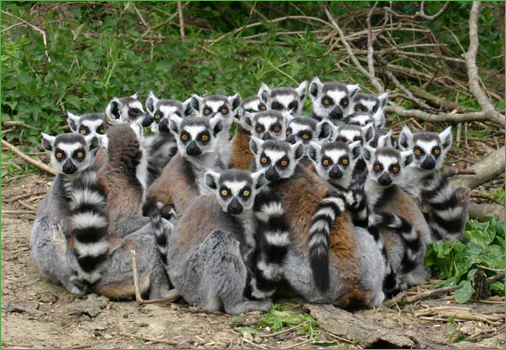
By RIVONALA RAZAFISON in Antananarivo
Researchers have denounced the rampant practice of keeping lemurs illegally as pets in Madagascar.
An estimated 28,000 lemurs, the world’s most endangered primate species, have been illegally kept as pets in urban areas of the island nation over the past three years, they emphasised.
Such an attitude was possibly threatening conservation efforts and hastening the extinction of some of lemur species. The preliminary results from a new survey by researchers from Temple University and the University of Utah indicated that ring-tailed lemurs (Lemur catta) were the species most impacted by the in-country illegal pet trade.
Launched on January 9th 2015, the programme aimed to collect data through the duration of the year.
Researchers presented their preliminary findings titled “Live capture and ownership of lemurs in Madagascar” at the 27th International Congress for Conservation Biology held two weeks ago in Montpellier, France.
Led by Dr. Kim Reuter, who currently works at Conservation International in Washington, DC, the team used an online global survey to collect information from over 335 individuals who had seen 685 different pet lemurs in the country over the past few years.
Surprisingly, and despite the fact that respondents observed over thirty different lemur species, 28 per cent of the observations of pet lemurs in Madagascar were of ring-tailed lemurs, the team leader noted in a release. No other species was observed by more than 10 per cent of respondents.
“It has been very unclear which lemur species is most impacted by the illegal pet trade in Madagascar. This has made it very hard to properly target conservation initiatives,” Dr. Reuter said.
“Now that we know that ring-tailed lemurs are highly impacted by this trade, we can move to create targeted outreach programmes focusing specifically on this species.”
The expert said that although pet lemur ownership is illegal, enforcement of the law seems to be relatively weak. The researcher said that lemurs are often kept in hotels, resorts, and restaurants where they are kept as an amenity for tourists.
“Ring-tailed lemurs are a flagship species for Madagascar, though its popularity with the public may be the very reason why it is also so commonly kept as a pet,” she said.
“This specie, which has been seen in Disney movies and countless documentaries, is perhaps the most recognisable lemur specie across the world. Now, and maybe due to demand from tourists visiting Madagascar, we have evidence that hundreds of ring-tailed lemurs are being kept as pets there, and often not in acceptable circumstances,” she opined.
With ring-tailed lemurs observed as pets in almost every corner of the country and sometimes over 1,000 km away from their natural habitat ranges, Dr. Reuter said Madagascar’s extensive lemur pet ownership could be a larger threat to the species than previously recognised.
Ring-tailed lemurs are endangered and it is likely that less than 10,000 individuals remain in the wild.
“It is incomprehensible that this species, which is used across the world as a symbol for Madagascar’s rich biodiversity, is being kept illegally across the country and often in the open,” she said.
“We need to address the pet lemur trade in Madagascar or we risk losing yet another species,” the expert launched.
Illegal hunting, quick shift in the natural habitat, and deforestation have been considered as among the biggest threats to these animals so far.












